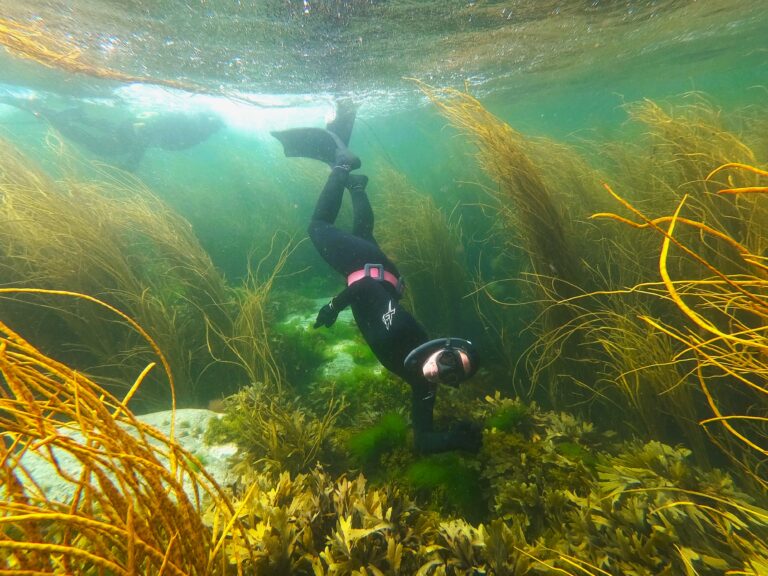Project Description
Marine environments are facing multiple challenges due to climate change as well as the direct human impacts that come from resource extraction and physical alteration of habitats. In this context, a network of Marine Protected Areas has been set up in the UK as a place-based measure to protect species, their habitats and the ecosystem services that these provide. Although more attention has generally been paid to provisioning services (e.g. fishing) and regulating services (blue carbon storage and sequestration in marine habitats), cultural ecosystem services such as recreation are now increasingly recognised as an integral part of ecosystem services. However, intangible and immaterial cultural ecosystem services still remain underassessed in comparison to more easily quantifiable services such as fishing or recreation.
In recent years, interdisciplinary research drawing on the social sciences and humanities has emerged to assess cultural values of terrestrial landscapes. However, cultural values of underwater landscapes and marine habitats still remain under researched, with few exceptions. For example, a study assessed anglers’ and divers’ recreational values of UK marine protected areas (Jobstvogt et al. 2014), but did not incorporate immaterial values. A seminal study by Urquhart and Acott (2014) provides an example of one of the few such projects in the UK, which used ethnographic methods to study sense of place in fishing communities in Cornwall.
The proposed PhD project aims to address this research gap by studying immaterial cultural values of marine environments in marine protected areas in the UK. The proposed work will use a comparative approach of two case study areas (one longer established and one recently-designated MPA) in inshore waters, where community relations with seascapes are expected to be closer than e.g. with deep sea habitats. The methodological approach will be iterative, with ethnographic methods, including participatory mapping of underwater areas in community workshops and with stakeholders (Scully-Engelmeyer et al. 2021) to explore the diverse cultural values associated with different places on, in and above the water, and how these cultural values relate to a sense of place and identity of coastal communities. The PhD will thus explore underwater cultural ecosystem services and contribute to building an evidence-base for policy and decision-making in marine conservation.
The PI for this project, Dr. Flurina Wartmann, is a Senior Lecturer (Grade 8) with a 100% permanent contract at Aberdeen University for the duration of the proposed PhD. The proposed PhD has four supervisors, two at the University of Aberdeen (Wartmann and Pierce, Geosciences) and two at Queen’s University Belfast (Dunnett, School of Built and Natural Environment and Helyar, School of Biological Sciences), with Helyar and Wartmann having experience with supervision of Quadrat DTP students, and all supervisors have previous experience of successfully supervising PhD students. The supervisory team incorporates interdisciplinary expertise across cultural ecosystem services (Wartmann, PI), cultural identity and place (Dunnett, Pierce) and marine environments in the UK (Helyar), and is thus ideally placed to supervise and support a student working on the intersection between cultural values and marine environments.
CANDIDATE BACKGROUND
Essential skills:
- Background in social science, human geography, cultural anthropology, environmental psychology, or similar experience is necessary
- Excellent written and oral communication skills in English are necessary
- The candidate should be willing and able to travel independently for fieldwork and conduct independent fieldwork in rural locations
- Willingness to develop capacities in social science methodologies is essential
- An interest in working across disciplines is essential
Desirable skills:
- Previous experience in working in remote locations, and in the context or marine conservation, ideally in the UK, is highly desirable
- Previous experience of engaging with cultural ecosystem services would be highly beneficial
- An understanding of relevant methods associated with collection and analyses of qualitatively or quantitatively derived social science data is desirable
- An interest in integrating arts-based methodologies for community engagement to explore immaterial values through images, art work or written texts would be desirable
- A valid driver license for the UK is highly desirable
Image credit: F. Wartmann
Supervisors
Flurina WartmannPrimary Supervisor: | Profile: Flurina Wartmann Email: flurina.wartmann@abdn.ac.uk Institution: University of Aberdeen Department/School: School of Geosciences |
Secondary Supervisor: | Dr. Oliver Dunnett, Queen’s University Belfast, School of Natural and Built Environment / Culture and Society Email: o.dunnett@qub.ac.uk |
Additional Supervisor: | Dr. Joseph Pierce, University of Aberdeen, School of Geosciences / Geography and Environment Email: joe.pierce@abdn.ac.uk |
Sarah HelyarAdditional Supervisor: | Profile: Sarah Helyar Email: s.helyar@qub.ac.uk Institution: Queen's University, Belfast Department/School: School of Biological Sciences |
References
Jobstvogt, N., Watson, V., & Kenter, J. O. (2014). Looking below the surface: The cultural ecosystem service values of UK marine protected areas (MPAs). Ecosystem Services, 10, 97–110.
Urquhart, J., & Acott, T. (2014). A Sense of Place in Cultural Ecosystem Services: The Case of Cornish Fishing Communities. Society & Natural Resources, 27(1), 3–19.
Scully-Engelmeyer, K. M., Granek, E. F., Nielsen-Pincus, M., & Brown, G. (2021). Participatory GIS mapping highlights indirect use and existence values of coastal resources and marine conservation areas. Ecosystem Services, 50, 101301.
QUADRAT Themes
- biodiversity
- environmental-management






















































